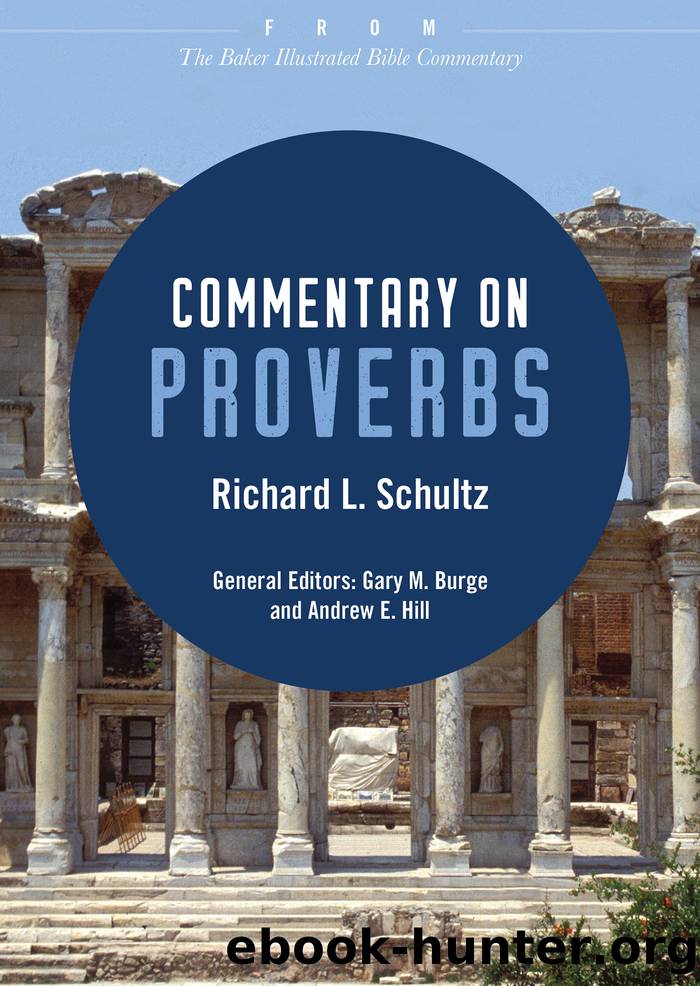Commentary on Proverbs by Richard L. Schultz

Author:Richard L. Schultz [Burge, Gary M. and Andrew E. Hill]
Language: eng
Format: epub
Tags: Bible Commentary/Old Testament, REL006050, REL006060
ISBN: 9781493424542
Publisher: Baker Publishing Group
Published: 2019-10-24T00:00:00+00:00
According to Proverbs 12:11, âThose who work their landââlike the figure in this wooden model, who is plowing with two oxen (Egypt, second millennium BC)ââwill have abundant food.â [Copyright © Baker Photo Archive. Courtesy of the British Museum.]
Proverbs 12:8â12 focuses on work. Oneâs reputation should be derived from oneâs prudence (12:8), not from oneâs pretense (12:9). On the farm, righteousness expresses itself even in oneâs treatment of animals (12:10) and wisdom in diligently tilling the field to produce plentiful crops (12:11). Metaphorically speaking, employing a wordplay connected to agriculture, the righteous personâs ârootâ yields fruit (12:12). An additional word repetition is suggestive: those who lack sound judgment (12:11b) will likely lack bread (12:9b). The wicked, however, are not content to âchase fantasiesâ (12:11b), preferring a âsnareâ to capture prey (12:12a; cf. KJV ânetâ; the NIVâs âstrongholdâ substitutes the object for the instrumentâthe meaning here is disputed).
Speech is the focus of the lengthy unit 12:13â23. Ironically connected to the preceding verse (12:12a), evil persons can themselves be âsnaredâ (NIV âtrappedâ) by their own defiant utterances (12:13a), although oneâs lips can bear good âfruitâ as well (12:14a). The wise heed spoken advice, while fools think they need none (12:15). The shrewd also ignore an insult, while fools immediately respond by displaying their vexation (12:16; cf. 9:7). In a legal setting, honest rather than deceitful testimony is sought (12:17); both inside and outside the court, words can hurt or heal (12:18). Truth will ultimately prevail, much to the joy of those promoting peace, but lies will be exposed, as will the deceitful hearts that spawned them (12:19â20). Trouble will therefore overwhelm the wicked, while the righteous will be spared (12:21; cf. 22:8), because the Lord detests lying lips while approving of those who are trustworthy (12:22; cf. 12:2). Thus speech is a key area in which the wise and the foolish greatly differ. The wise do not tell all they know; the foolish loudly proclaim their folly (12:23, also 12:15â16).
Workâs reward is mentioned in passing in verse 14b; in verses 24â27, the contrast between the diligent and the lazy frames a brief unit. The diligent will rise to exercise authority over others or at least enjoy hearty meals, while the lazy will descend to conscripted labor or at least go hungry (12:24, 27). Verse 25 recalls another important power from the preceding sectionâthe healing power of the tongue (cf. 12:18b). If one modifies the vowels of its first word, 12:26 affirms that âthe righteous has an advantage over his neighborâ (Heim, 157), as illustrated in verse 27, since the righteous are, in Proverbsâ conceptual world, both wise and diligent. Verse 28 concludes the chapter, contrasting the âway of the wickedâ (12:26) with the âway of righteousnessâ (12:28), which leads not simply to a long and full life but even to an unending life (literally âno deathâ; NIV âimmortalityâ; see also Waltke 2004, 518).
13:1â25. Following an introductory proverb affirming the receptivity of the wise (13:1), Proverbs 13:2â6 briefly takes up themes of the previous
Download
This site does not store any files on its server. We only index and link to content provided by other sites. Please contact the content providers to delete copyright contents if any and email us, we'll remove relevant links or contents immediately.
Fangirl by Rainbow Rowell(9210)
How to Bang a Billionaire by Alexis Hall(8126)
Wonder by R. J. Palacio(8085)
The Space Between by Michelle L. Teichman(6911)
The Thirst by Nesbo Jo(6906)
Assassin’s Fate by Robin Hobb(6184)
Wiseguy by Nicholas Pileggi(5743)
The Night Circus by Erin Morgenstern(5201)
Paper Towns by Green John(5162)
The Kite Runner by Khaled Hosseini(5150)
Bittersweet (True North #1) by Sarina Bowen(4830)
Gerald's Game by Stephen King(4623)
Too Much and Not the Mood by Durga Chew-Bose(4319)
Pillow Thoughts by Courtney Peppernell(4261)
Goodbye Paradise(3790)
Twelve Days of Christmas by Debbie Macomber(3544)
Good by S. Walden(3532)
The Rosie Effect by Graeme Simsion(3445)
The Cellar by Natasha Preston(3315)
